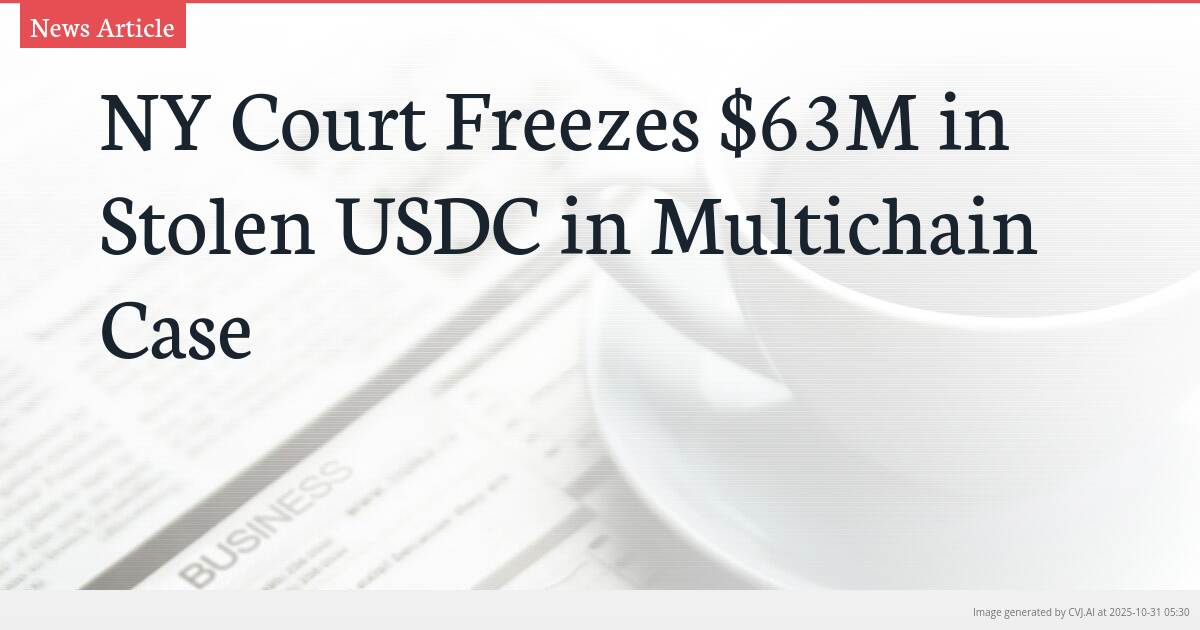This summary text is fully AI-generated and may therefore contain errors or be incomplete.
Introduction
A New York judge has extended a freeze on three Ethereum wallets containing approximately $63 million in stolen USDC stablecoins, creating a pivotal legal standoff between Singapore liquidators and U.S. investors. The provisional order under Section 1519 of the U.S. Bankruptcy Code supports KPMG Singapore’s efforts to secure Chapter 15 recognition for Multichain’s liquidation while pausing a competing class action from American claimants. This case represents a critical test for cross-border cryptocurrency insolvency proceedings and could set precedent for how international crypto bankruptcies are handled in U.S. courts.
Key Points
- Multichain was a major cross-chain bridge that held $9.2 billion in total value locked at its peak in early 2022 before collapsing in 2023
- The case involves competing claims between Singapore liquidators and U.S. investors over the same $63 million in frozen USDC assets
- Chapter 15 recognition would allow Singapore liquidators to locate, preserve, and recover Multichain's assets under U.S. court supervision
Legal Battle Over Frozen Assets Intensifies
Judge David S. Jones of the Southern District of New York issued a provisional order requiring Circle to maintain the freeze on three Ethereum wallets holding roughly $63 million in stolen USDC stablecoins. The ruling comes in response to urgent requests from Singapore-based liquidators at KPMG who are seeking formal U.S. recognition of Multichain’s bankruptcy proceedings. The order specifically directs Circle to preserve the dollar reserves backing the stolen USDC, with liquidators warning that lifting the freeze could cause ‘immediate and irreparable harm’ if assets were moved or claimed outside the legal process.
The court’s intervention under Section 1519 provides temporary relief while it determines whether Singapore’s liquidation qualifies as a ‘foreign main proceeding’ under Chapter 15 of the U.S. Bankruptcy Code. This provisional measure highlights the urgency of preserving assets before formal recognition of the foreign case. Simultaneously, the order pauses a separate class action where U.S. investors had been seeking control of the same $63 million through litigation against Circle. That case was recently moved from New York state court to federal jurisdiction after Circle invoked the Class Action Fairness Act.
Multichain's Spectacular Collapse
Multichain, formerly known as Anyswap, was once one of cryptocurrency’s most prominent cross-chain asset bridges, facilitating movement between major networks including Binance Chain, Avalanche, Polygon, and Ethereum. The platform operated by locking tokens on one blockchain and issuing equivalent tokens on another, enabling users to transfer assets between otherwise separate networks without selling or converting them. At its peak in early 2022, Multichain had achieved remarkable scale with approximately $9.2 billion in total value locked according to DefiLlama data, making it a cornerstone of the decentralized finance ecosystem.
The platform’s troubles began in May 2023 when transactions started freezing unexpectedly and reports surfaced that CEO Zhaojun had been arrested and detained in China. The situation escalated dramatically in July 2023 when more than $125 million in assets were moved from Multichain’s wallets in what the team described as ‘abnormal’ transfers to unknown addresses. This massive outflow prompted an immediate shutdown of the bridge’s operations, leaving users stranded and triggering the current liquidation proceedings in Singapore. The $63 million in USDC now frozen represents a portion of these disputed transfers.
Cross-Border Implications for Crypto Insolvency
The case represents a significant test for Chapter 15 of the U.S. Bankruptcy Code, which governs cross-border cooperation in insolvency matters. If the Singapore liquidation receives formal recognition as a foreign main proceeding, it would authorize the KPMG Singapore liquidators to act within the United States to locate, preserve, and recover Multichain’s assets under coordinated court supervision. This outcome would provide a structured framework for distributing recovered assets to creditors worldwide, potentially superseding the claims of U.S. investors pursuing separate litigation.
The competing claims between Singapore liquidators and U.S. investors highlight the complex jurisdictional challenges facing cryptocurrency insolvencies. The provisional freeze order demonstrates how U.S. courts can provide emergency protection for digital assets while navigating the recognition process for foreign proceedings. Attorney Joel H. Levitin, representing Multichain, along with Circle and the KPMG Singapore liquidators, are central figures in this legal drama that will determine how cross-border crypto bankruptcies are handled in the future. The outcome could establish important precedent for coordinating international asset recovery in the increasingly global cryptocurrency ecosystem.
📎 Read the original article on decrypt.co

